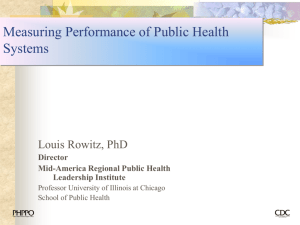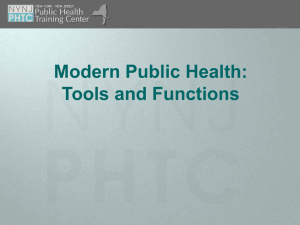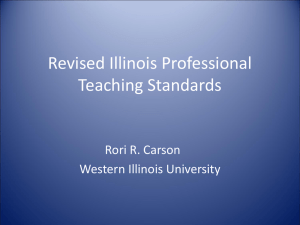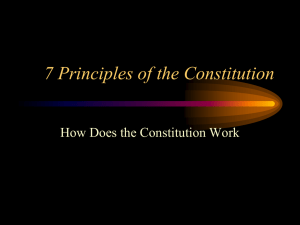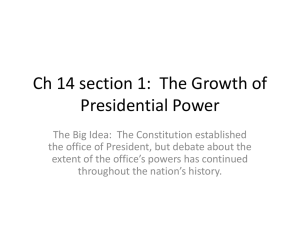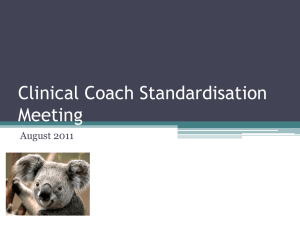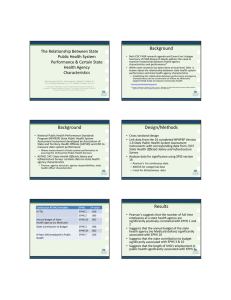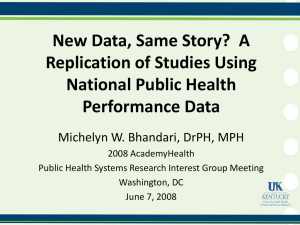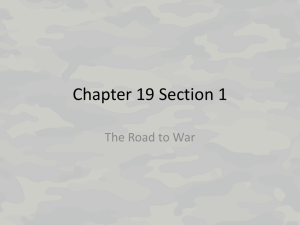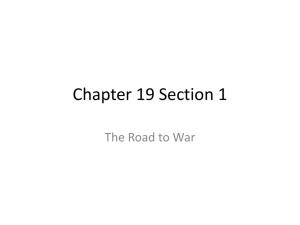MLP In-Person Meeting Presentation: Public Health 101
advertisement
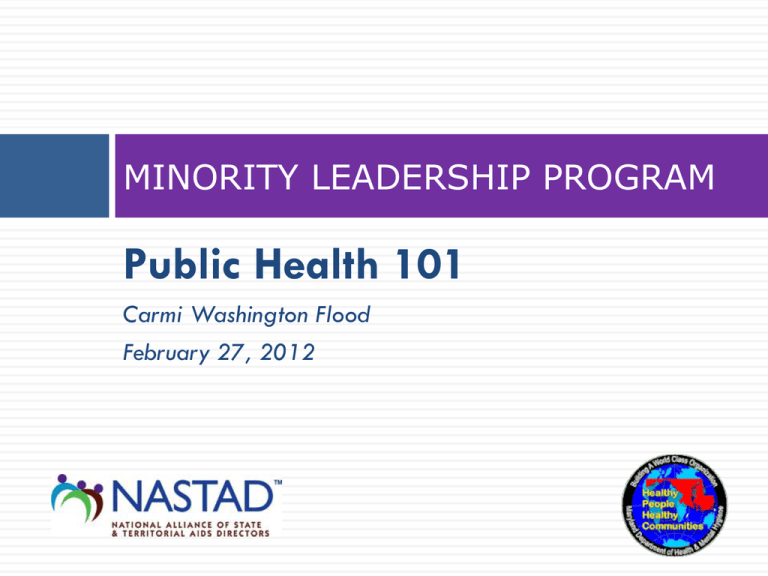
MINORITY LEADERSHIP PROGRAM Public Health 101 Carmi Washington Flood February 27, 2012 What is Public Health? “The science and art of preventing disease, prolonging life and promoting health and efficiency through organized community effort… which will ensure to every individual in the community a standard of living adequate for the maintenance of health.” Winslow, 1923 public health n. The science and practice of protecting and improving the health of a community, as by preventative medicine, health education, control of communicable diseases, application of sanitary measures, and monitoring of environmental hazards. (The American Heritage Dictionary) Public Health Approach Surveillance: What is the problem? Problem Risk Factor Identification: What is the cause? Intervention Evaluation: What works? Implementation: How do you do it? Response What is Public Health? Mission of public health: Fulfilling society’s interest in assuring conditions in which people can be healthy. Public health is addressed by public and private organizations. Governmental public health agencies have unique roles for assessment, policy development and assurance. From: The Future of Public Health, Institute of Medicine, 1988. Where Does the Authority for Public Health Come From? Public health powers were carried out by states before the US government was formed. The Constitution delegated certain powers to the federal government. The rest were reserved for the states. States’ authority for regulation to protect public health and to provide services is based on the “police power” (relates to protecting health and safety). States delegate power to cities and counties. Where Does the Authority for Public Health Come From? (cont’d) Federal powers stem primarily from the Constitution’s “commerce clause” (gives the federal government power to regulate trade between states and with other counties) and the ability to tax and spend money. Federal grant and reimbursement program requirements extend federal agencies’ influence. They often place requirements on states and localities that accept the funds (funding comes with “strings attached”). What Are the Overarching Roles of Governmental Public Health Agencies? Assessment: Collection, analysis, publication of data on health of the community (e.g., epidemiologic data, health statistics, needs assessments). Policy Development: Leading/participating in policy development. Policy role can include development of laws and regulations. Assurance: Make sure quality services necessary to achieve goals are provided. From: The Future of Public Health, Institute of Medicine, 1988. What Does Public Health DO? Public Health Prevents epidemics and the spread of disease Protects against environmental hazards Prevents injuries Promotes and encourages healthy behaviors Responds to disasters and assists communities in recovery Assures the quality and accessibility of health services Essential Services of Public Health Monitor health status Diagnose and investigate Inform, educate, and empower Mobilize community partnerships Develop policies and plans Enforce laws and regulations Link people to needed services / assure care Assure a competent workforce Evaluate health services Research The Essential Public Health Services (EPHS) “translated” Understand health issues at the state and community levels (Or “what’s going on in our state/community? Do we know how healthy we are?”) Identify and respond to health problems or threats (Or “Are we ready to respond to health problems or threats? How quickly do we find out about problems? How effective is our response?”) Keep people informed about health issues and healthy choices. (Or “How well do we keep all people and segments of our State informed about health issues?”) The EPHS “translated” (cont’d) Engage people and organizations in health issues. (Or “How well do we really get people and organizations engaged in health issues?”) Plan and implement sound health policies. (Or “What policies promote health in our State? How effective are we in planning and in setting health policies?”) Enforce public health laws and regulations. (Or “When we enforce health regulations are we upto-date, technically competent, fair and effective?”) The EPHS “translated” (cont’d) Make sure people receive the medical care they need. Maintain a competent public health and medical workforce. (Or “How can we be sure that our staff stays current?”) Evaluate and improve programs. (Or “Are we doing any good? Are we doing things right? Are we doing the right things?”) Support innovation and identify and use best practices. (Or “Are we discovering and using new ways to get the job done?”) MARYLAND INFECTIOUS DISEASE AND ENVIRONMENTAL HEALTH ADMINISTRATION http://ideha.dhmh.maryland.gov
